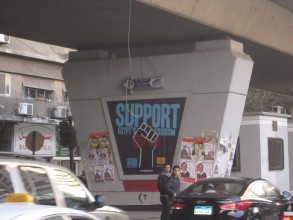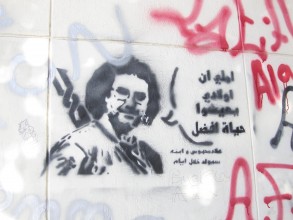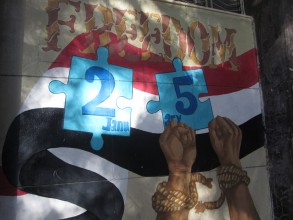Descending onto Cairo is surreal. From afar, looking down, it seems as if the green and sand are broken into tiny farmshares; as you get closer, however, you realize that those are actually buildings, all identical, though of varying heights, and laid out in what is actually a rather orderly formation. Closer still, and you’re struck by how uniform the buildings are in both width and color, how the city appears to be painted in sand. And the traffic – you can actually see where the bottlenecks occur from the air (and Anas, Damascus traffic doesn’t hold a candle to Cairo; nor, for that matter, to Beirut or even Casablanca, but I digress).
Only now do I understand why a former colleague in Morocco, upon arriving there from Cairo, felt Moroccan cities to be provincial. Cairo, on the other hand, is anything but.
I just returned on Sunday from one all-too-short week in Cairo. I was there for Yahoo!’s Change Your World Summit, an event that brought together women

from Egypt and around the region, to speak about online safety, but stayed for a few (too few, really) days extra, in order to meet with activists, organizations, and of course, friends.
My interest in Egypt stems from the bloggers and activists I’ve met over the years who come from there. Prior to and during the revolution, they were my lens into Cairo, and on January 25, 2011, when nearly all of them took to the streets, I did my best to support them from my perch in Cambridge, repeating their words from Twitter and phone calls and redirecting media in their direction whenever possible. But beyond the story of the Egyptian Internet (about which I have some authority), I am no expert, a fact made all the more apparent by my first visit to the country last week.
First Impressions
If at any point I sound orientalist or naive, allow me to explain: Most of my time in the region has been spent in its less-developed cities and countries. My point of comparison is not Beirut but Meknés; I therefore live each new experience shadowed by my years in Morocco, my point of comparison for the region as if it were my homeland.
I was utterly impressed everywhere I stepped by the utter vibrancy of Cairo. The graffiti that graced the walls and buildings of Zamalek and downtown that–as my friends pointed out–didn’t exist before the revolution, has become a multi-layered narrative at points: in one spot, a tank–once just a tank–is now crushing protesters; added to that a crowd of Egyptians waving their flags. The cafés and bars of the city’s centers vary from old and smoky to fresh, modern (and smoky) but are visited by both men and women, often in fairly equal numbers.
Before traveling, friends–many of whom had been to both Morocco and Egypt–warned me in numbers of Cairo’s street harassment, its untiring vendors, its poverty. The latter I only witnessed briefly, in drives through the city, and therefore cannot comment. But as for the rest, I fear Cairo’s reputation is at least somewhat unearned.
I asked an American friend who has lived in Cairo for a few years if the lack of harassment I experienced was a side effect of the revolution. She said that she’d never felt unsafe, had never been sexually harassed on the city’s streets. Another friend, a native Egyptian who’d spent much of her life abroad said she had, but that it’s not as bad as foreigners are lead to believe. “And anyway, they’re scared of us now,” she explained, referring to the women’s marches that had taken place throughout the year.
The vendors and faux guides were another story: On Friday, I went to the pyramids alone in the afternoon, knowing that the day of prayer would minimize traffic in Giza. I hadn’t even arrived when the harassment started. Men would approach the taxi, lean in, and tell me “The pyramids are closed today, ma’am, but I’ll take you to a shop” or “I work at the pyramids, you can pay me as your guide.” Some had fake ID cards. I pity the silly foreigners who don’t read ahead. After purchasing my ticket and heading inside, I expected things to get better, but in fact, they quickly got worse. Young men with postcards and trinkets bombarded me with attention, while more “guides” attempted to sell me their services for a “mere 200 pounds.” Harassed, and exhausted, I quickly made my way behind the first pyramid to stage a photo and snare my prey…
Having lived in Morocco for several years, I’m no newbie, and so whipped out a timeless old strategy. I cannot, of course, divulge, but let’s just say it involves finding the oldest male guide you can, faking a certain identity, and paying him the most you’re willing to shell out, in exchange for him giving you a decent tour and…most importantly, warding off the rest of the harassment. It worked – $20 and a small bottle of perfume from his “friend’s” shop later, I was on my way back home complete with a memory card full of photos.

My guide wasn’t too forthcoming with his political opinions but after a decent amount of conversation, I was able to discern that he was simultaneously happy about the ouster of Mubarak and wary of the continued protests. I asked him about the old regime; “if you had three horses and three children and had to choose which to feed, what would you do?” he responded, elaborating on the corruption of the Mubaraks. “But,” he added, “the shabab need to give it time.”
Aside from the guide, a few cab drivers, and my hotel staff, however, my interactions were limited to the Twitterati. This isn’t necessarily a bad thing, of course: I was fascinated to hear, over beers, the intricacies in differing opinions between this and that group. And aside from that, of course, it was wonderful to finally meet so many of the people I’ve interacted with – some since January 25, and some long before.
I only wish I’d had more time: time enough to observe the protests, time enough to see if my friends’ predictions were to come true…but alas, work calls, and I’m grateful for the bit of time I did get to spend in um al-dunya.
The Revolution Continues
There were plenty of other elements to my trip, and not all are fit for print. Those that are–namely, those pertaining to the days leading up to today, the anniversary of the revolution–I have been unable to fit into the above narrative and will therefore lay out in bullet points; forgive me.
- Kazeboun, or “liars,” is a campaign whereby activists, armed with a projector and a screen, take up public spaces to show videos made for and about the revolution. Many of my friends and acquaintances (several of whom do not, contrary to my own pre-formed beliefs, know each other) spoke highly of these efforts, and had taken part in them. The Daily News Egypt has a short descriptive piece about Kazeboun here, noting how the project “implicitly highlights the importance of public space and its usage to voice political dissent.”
- Journalism: As an observer for the past year, I’ve been very curious as to how Egyptians have perceived the foreign media’s coverage of the revolution. And while this subject, frankly, deserves its own blog post, I was surprised to learn that aside from the old establishment (Friedman and his outlet in particular), the American media seems to have done a fair job in representing public opinion–contrast that with Syria, for example. Of course, there are plenty of instances deserving of criticism, but I was a bit surprised that the American media wasn’t the butt of more jokes.
- The Mosireen collective, which I had the pleasure of visiting, has a great space that’s open most days from noon until 10pm. Though I dropped by when it was empty, the collective offers training, technical support, film screenings, and even lends out equipment to would-be filmmakers. Their YouTube channel, I was reminded repeatedly during my visit, is among the top 5 of Egyptian NGOs and has received more than 2 million hits since its inception.
- The release of blogger Maikel Nabil, which happened today, was an interesting point of discussion. I was with a number of people on Saturday night

A mural memorializing January 25 when it was first announced, and their views were largely skeptical–as in, “the military is only doing this to look good.” This sentiment is what I’ve seen echoed all day on Twitter. Throughout the past ten months of Nabil’s detention, I’ve had a number of private conversations about how the blogger has received little support compared to others because of his pro-Israel views; though that is apparently true, there are a number of people who’ve been fighting hard for his release, as well as the release of others subject to military trials this past year.
- The question of protest. I arrived on a Tuesday and spent Wednesday asking people what they thought was going to happen on Friday. Most said nothing, or that they were not personally going to Tahrir until the 23rd, but nevertheless, Friday actually had considerable turnout. I spent the 23rd on a plane, and so was unable to follow along with tweets as I usually do, but am keeping my friends–the vast majority of whom planned to hit the streets tomorrow–close in my mind today.
One reply on “On the Anniversary of the Egyptian Revolution…”
[…] On the Anniversary of the Egyptian Revolution… […]